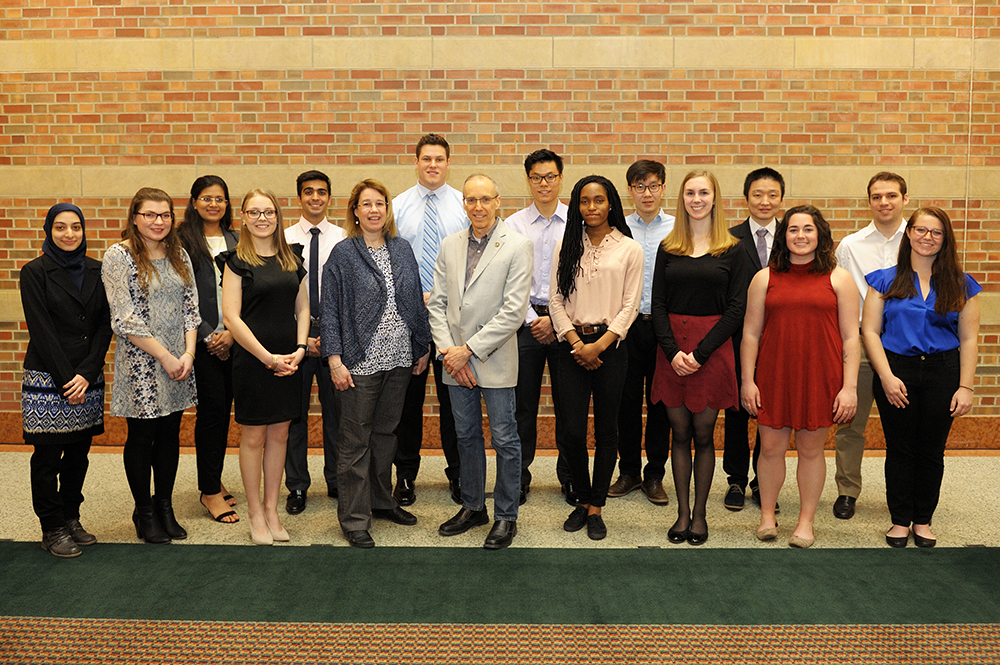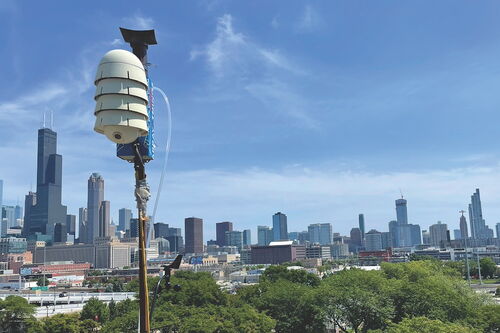LAS students receive research awards

Ten students in the College of LAS were recently named recipients of the 2018 Beckman Institute student awards. The awards, which are presented to undergraduate and graduate students, were presented to students in a recent reception and will allow them to pursue a variety of research opportunities.
The Beckman Institute for Advanced Science and Technology is an interdisciplinary research institute devoted to leading-edge research in the physical sciences, biology, behavior, cognition, neuroscience, computation, and engineering. It is directed by Jeffrey Moore, the Murchison-Mallory Professor of Chemistry.
Fifteen students from across campus received awards. The LAS honorees are as follows:
Lotanna Ezenekwe, a sophomore in molecular and cellular biology, received a Beckman Institute Undergraduate Fellowship. She will examine the change in parental care behavior after a disruption in the social hierarchy of Amphiprion ocellaris, a species of fish native to the warm waters found in the Pacific and Indian Oceans, commonly known as clownfish or anemonefish. She will do her research under the direction of Justin Rhodes, an associate professor of psychology and member of the Cellular and Molecular Foundations of Intelligent Behavior Group.
Vanessa Kalinowska, a junior in molecular and cellular biology, received a Beckman Institute Undergraduate Fellowship. She plans to do her research in the laboratory of Daniel Llano, an associate professor of molecular and integrative physiology and member of the Cellular and Molecular Foundations of Intelligent Behavior Group. Through her project she will examine the effect of aging on the organization of long-range projections from the mouse auditory cortex to the auditory midbrain (inferior colliculus).
Madison N. Wilson, a junior working toward a dual degree in electrical engineering and behavioral neuroscience psychology, received a Beckman Institute Undergraduate Fellowship. She plans to perform computational analysis and automation of neural metabolic interactions between neurons and glial cells. Her research will take place in the Biophotonics Imaging Lab under the guidance of Stephen Boppart, a professor of electrical and computer engineering (ECE), and Andrew Bower, a Beckman Institute Graduate Fellow working toward his PhD in ECE—both members of the Bioimaging Science and Technology Group.
Shivang Chaudhary, a junior in molecular and cellular biology and psychology, received a Carle Neuroscience Institute Undergraduate Research Award. He plans to work under the guidance of Catherine Christian, an assistant professor in molecular and integrative physiology and a member of the Cellular and Molecular Foundations of Intelligent Behavior Group. He will study hypothalamic gliosis and inflammation in a mouse model of temporal lobe epilepsy, which is the most prevalent type of epilepsy in adults.
Michael Szewczyk, a junior in molecular and cellular biology and psychology, received a Carle Neuroscience Institute Undergraduate Research Award. He plans to continue his research of the in vitro treatment of mild to severe traumatic brain injury (TBI), and its role in preventing neurodegenerative disorders. This will include investigating the effect of docosahexaenoic acid and hypothermia in treating post-TBI neurons. He will work in the lab of Catherine Best, in partnership with the lab of Gabriel Popescu. Best is a research assistant professor of bioengineering, and Popescu is a professor of electrical and computer engineering—both are members of Beckman’s Bioimaging Science and Technology Group.
José González, a sophomore in molecular and cellular biology, and psychology, received the Erik Haferkamp Memorial Award for Undergraduate Research. He plans to study the effects of bisphenol A (BPA) on sexual differentiation and behavior of Amphiprion ocellaris, a species commonly known as clownfish or anemonefish. He will work with the metabolomics center. Justin Rhodes, an associate professor of psychology and member of the Cellular and Molecular Foundations of Intelligent Behavior Group, will supervise the research.
Dominica Lange, a junior in psychology with a concentration in behavioral neuroscience, received the Janssen Family Undergraduate Research Award. She will work in the Rhodes Lab, to test the hypothesis that bisphenol A (BPA) contaminants in the feed of fish leads to an effect on sex change within the Amphiprion ocellaris due to the properties of BPA as an endocrine disruptor.
Elizabeth Phillips, a junior in psychology and anthropology, received the Janssen Family Undergraduate Research Award. She plans to continue to study and document how step-fathering behavior of non-breeder Amphiprion ocellaris changes as members of the breeding pair are removed. She will work with Justin Rhodes, an associate professor of psychology and member of the Cellular and Molecular Foundations of Intelligent Behavior Group.
Xuesong Yang is working toward his PhD in informatics, a multidisciplinary program with electrical and computer engineering, linguistics, and cognitive science. He received the Neurotechnology for Memory and Cognition Award. His research explores feasible solutions to linguistic mismatches for current automatic speech recognition by leveraging acoustic phonetics knowledge that presents capability of being transferred across different acoustic conditions and multiple languages. Yang will work with Mark Hasegawa-Johnson, a professor of electrical and computer engineering who leads the Statistical Speech Technology Group.
Kendra Zwonitzer, a junior in molecular and cellular biology, received the Neurotechnology for Memory and Cognition Award. She will study the impact of exercise on brain mitochondrial DMA (mtDNA) in the aging PolG mutant mouse. She will do her work in the lab of Daniel Llano, an associate professor of molecular and integrative physiology and member of the Cellular and Molecular Foundations of Intelligent Behavior Group.








